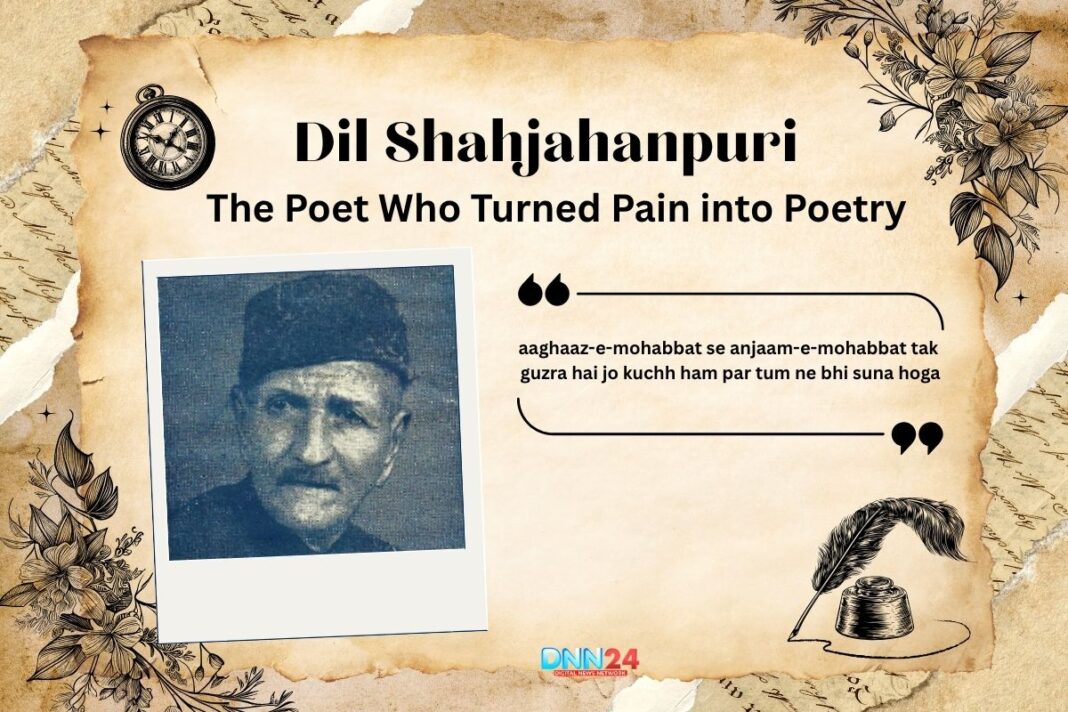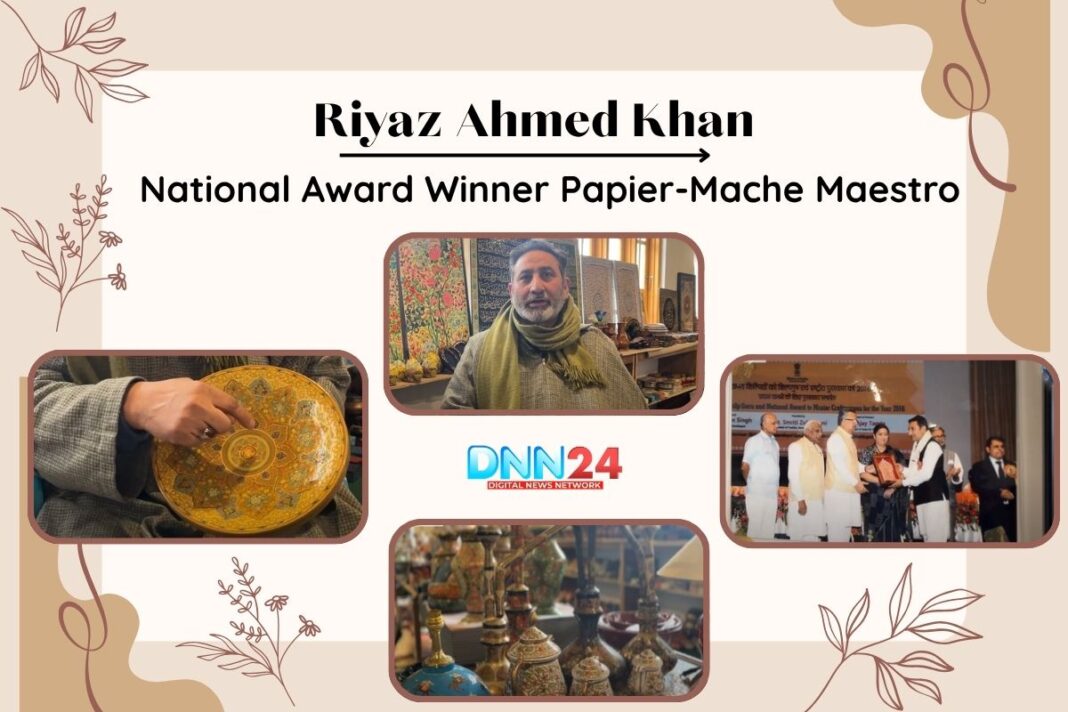It is just a case of picturing an unpaved road in Shahjahanpur in 1875. A boy named Zameer Hasan Khan, later immortalised as Dil Shahjahanpuri, begins to shape his destiny quietly. Was not born big,With big halls. His strength or money is not the initial thing that makes him special; it is an insurmountable desire to alter the everyday suffering of life into the lines that endure. His eyes are two-faced; one face is suffering, and the other is optimistic.
har sans hai sharh-e-nakaami phir ishq ko ruswa kaun kare
Dil Shahjahanpuri
takmil-e-wafa hai miT jaana jine ki tamanna kaun kare
The eyes were given to him by his teacher, to whom he owes everything, the legendary Ameer Meenai. It was not that to be a disciple was to be a poet, but to learn the pain of life, the giving up of the self, the delight of it, and to bend that through the sensitive mirror of words. Friends nodded and said he could turn an ordinary evening of silence into a symphony.
kucha-gardi mein jawani jaegi
Dil Shahjahanpuri
KHak ho kar zindagani jaegi
Dil is a poet of the rebellion of light in a world of shadows, in the background of British India. Shahjahanpur was not a poetic city, but every lane was tuned to creativity in the eyes of Dil. His life as a boy to a poet is a song of silent fight, though at times not heard by the rest of the world. Legend, lineage, makes not his story go thump, but rather the mere mundanity of his origins, and a lesson to all who dream, with middling origins, that art may blossom everywhere.
phir e’tibar-e-ishq ke qabil nahin raha
Dil Shahjahanpuri
jo dil teri nazar se gira dil nahin raha
Unheard, Untold: The Human behind the Ghazal
What do we lose when poets are given back to us in their couplets? Beneath the veneer of classical Urdu poetry, Dil Shahjahanpuri harboured everyday stories, some never shared beyond closest confidants. Dil would seek solace in the street bazaars of a world where mushairas of the high society were the order of the day, and Dil would find wisdom in the wrinkled street vendors or the mischievous school boys.
ai ‘ishq tu ne waqif-e-manzil bana diya
Dil Shahjahanpuri
ab marhalon ko aur bhi mushkil bana diya
One of the stories that is almost forgotten is the story of a rainy day when his handwritten ghazal papers were washed away in a flood. Wet, and heart-stricken, it is said that he gazed up and smiled, and promised to set down again every verse he had lost, and make it more firm than ever before–a sure token that a poet may work in the storm, or the sun.
ab koi gham-gusar hamara nahin raha
Dil Shahjahanpuri
duniya ko e’tibar hamara nahin raha
It was in the nights there that disease fettered his voice. And still, in bed, he would write fever-brow, the lullabies of his mother, and the patter of rain would bring more sweet and penetrating verses than ever. Friends recall that he never gave pain a chance to be the hero of his life story; every heartbreak, every loss was a drop of ink in the next poem. His actual life was a blend of duty (being a hakīm, or traditional physician) and thirst for expression, showing all that artistry and everyday responsibility can go hand in hand.
husn ne man liya qabil-e-tazir mujhe
Dil Shahjahanpuri
nazar aai hai mohabbat ki ye taqsir mujhe
Ghazals, Nazms and Shayari: Stories that are Told in Starlight
To understand Dil Shahjahanpuri, one must step inside his poetry—each ghazal and nazm is a miniature diary of feelings too vast for ordinary speech. Naghma-e-Dil and Tarana-e-Dil are his most famous pieces, and they are not proclamations but soft revelations. There is a life implication in the ghazal, Kia Kahiye Dastan-E-Tamanna Badal Gayi, -What to say, the story of longing has changed- and this is that he wrote these words when he felt a very personal loss, and he turned his sorrow into a common one.
mai-e-kausar ka asar chashm-e-siyah-fam mein hai
Dil Shahjahanpuri
saqi-e-mast ajab kaif tere jam mein hai
Other verses have stories that have never been heard. Dil, on one occasion, happened to be present at a party where some of the older poets were humiliating a young poet, and the influence of good nature joined with genius, and Dil rose and recited to the young poet one of his most touching nazms. His were songs of children and vanished hopes, but with a promise, of a promise, that was, Koocha gardi mein jawani jayegi; youth shall be spent in the lanes, and that all who heard him felt the meaning of the search to be the colour of life.
kya kahiye dastan-e-tamanna badal gai
Dil Shahjahanpuri
un ki badalte hi duniya badal gai
It was not the speech of an echo-chamber, it was the speech of the lonely heart, it was the speech of any who would find comfort. All the verses were true, of love, of parting, of hope, of despair, and it had an honesty, an honesty which drew, which healed unseen wounds.
jahan tak ishq ki taufiq hai rangin banate hain
Dil Shahjahanpuri
wo sunte hain hum un ko sar-guzasht-e-dil sunate hain
The Legacy of Inspiration Beyond Words: A Legacy of Dreamers of All Dreamers
Dil Shahjahanpuri’s journey wasn’t a mere literary ascension but a lesson for every soul forging hope from hardship. Although his days were not always sunny and heartbreaking, his legacy is big beyond popularity. It is about being resilient and seeing art as a means to heal yourself and everyone around you. Perhaps the most real of all is the manner of his lines, to breathe, not as ornament of words only but as mutes to the lost or the weary.
tamkin hai aur husn-e-gareban hai aur hum
Dil Shahjahanpuri
KHuddariyon ka KHwab-e-pareshan hai aur hum
It is a humility that is deeply inspiring: a shy man who revamped the Urdu poetry in a very subtle way, bringing out the theme of love and desire without any pretension. As you read a line of his, please think of the little Zameer who had the rain wash his poems and wrote them more earnestly. Or the old poet, in the lamplight, never to be sure of himself, saying what the common aches are bound to say.
be-sud hai ye josh-e-girya ai shama sahar ho jaane tak
Dil Shahjahanpuri
chhinTa tere ashk-e-paiham ka pahuncha na kabhi parwane tak
For writers, artists, and everyday people, Dil Shahjahanpuri’s life tells us we need not own the world to change it. Being alive and feeling is sometimes all that is needed, and even every page and every tribulation is a first draft of something beautiful that is to be.
Also Read: Fahmi Badayuni: The Quiet Torchbearer of Urdu Simplicity and Soul
You can connect with DNN24 on Facebook, Twitter, and Instagram and subscribe to our YouTube channel.



